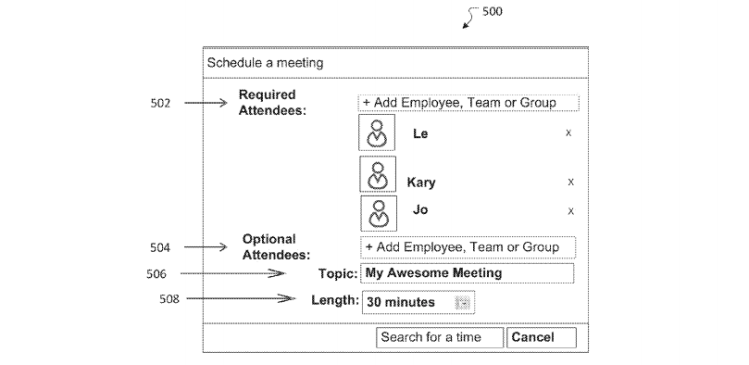While startups have come up with new ways to find times for people to hold meetings, Facebook has cooked up a system of its own.
Facebook in 2013 submitted to the U.S. Patent and Trademark Office an application for a patent called “System and methods for scheduling a meeting.” Today the patent was formally published.
The patent application includes an interesting concept called scoring to identify ideal meeting times and places. And of course, once the meeting organizer has determined the best possible time and place for the meeting, the system can send out calendar invitations.
The technology could have some major implications. It could help Facebook employees plan their meetings efficiently. But it could also become a part of the Facebook experience that hundreds of millions of people use.
It’s good timing for Facebook, which in the past few months has proven its interest in business software, with the release of the Facebook at Work app for web and mobile devices and the development of an internal customer relationship management tool.
And Facebook seems to get that its tool could be useful outside of Facebook. Patent authors John David Egan, Scott MacVicar, and Eric Sumner state:
Calendaring systems may be especially useful for organizations. Organizations can include businesses, schools, non-profits, and other entities. An organization often requires meetings among its members to conduct important business or otherwise advance its objectives through collaboration. However, despite the use of calendaring systems, the ability to schedule and conduct meetings is often complicated by the size and complexity of the organization.
Depending on how widely the system is implemented — if it is ever implemented — it could pose a challenge to existing calendar services, including Google Calendar. Indeed, Facebook has thought about how to make it accessible to lots of people. Potential data sources “may include Microsoft Outlook with Exchange Server or other calendar tool, for instance,” the patent authors wrote.
Facebook didn’t immediately respond to VentureBeat’s request for comment on the patent application.
The system from Facebook takes into consideration where exactly people have to go for an in-person meeting and how long it will take to get there. And “a social networking system” — like Facebook, for example — could be integrated, such that people on the social networks can share their calendars and schedule meetings.
The system looks at people’s statuses — like the dreaded out-of-office (OOF) — to see if meeting times would be convenient. It checks to see whether people are free five minutes before a given meeting time, which presumably means it’s aware of any back-to-back meetings, which can cause people to be late. The system also takes into consideration if people are free five minutes after the meeting. It could rule out rooms that might be too small for a proposed meeting. If proposed meetings fall on weekends or holidays, or before or after certain times, the system can change its score.
It could even acknowledge meeting participants’ tendencies — like “whether an attendee tends to miss or attend meetings on specific days or times in the day,” as the patent authors put it.
Oh, and yes, it’s mobile-friendly.
Here are some more images from the patent application:
VentureBeat's mission is to be a digital town square for technical decision-makers to gain knowledge about transformative enterprise technology and transact. Learn More



